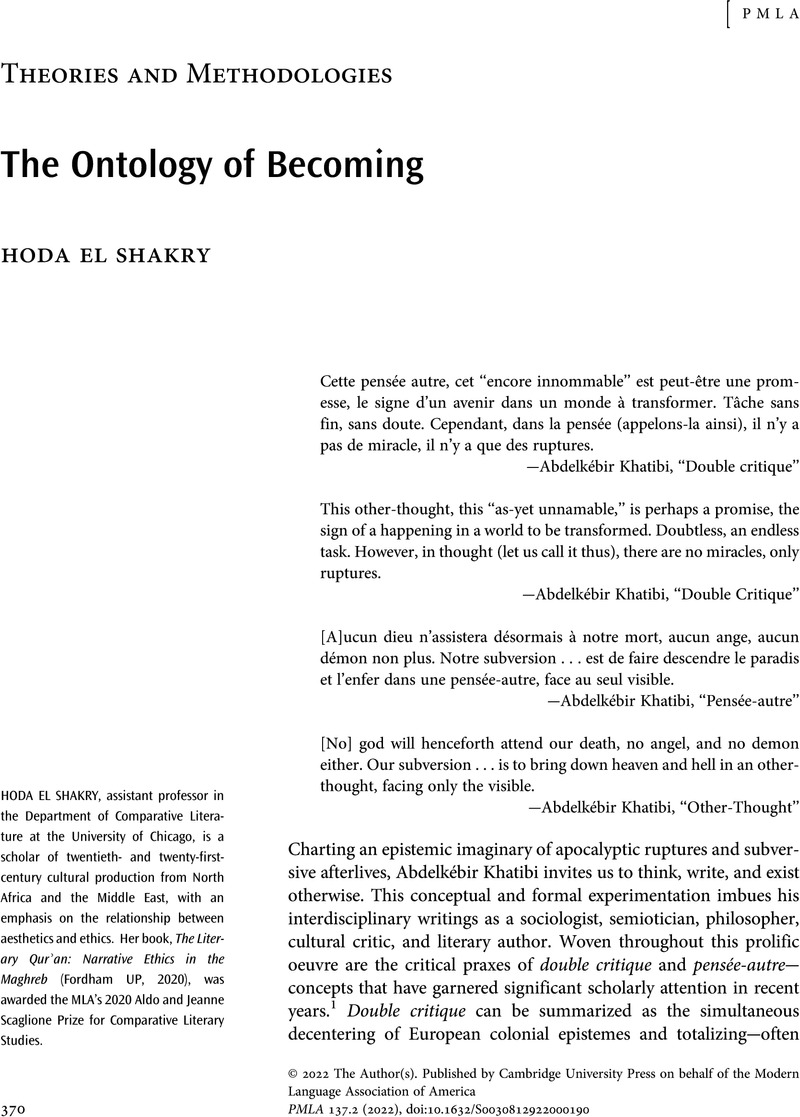No CrossRef data available.
Article contents
Abstract
An abstract is not available for this content so a preview has been provided. Please use the Get access link above for information on how to access this content.

- Type
- Theories and Methodologies
- Information
- Copyright
- Copyright © 2022 The Author(s). Published by Cambridge University Press on behalf of the Modern Language Association of America
References
Works Cited
Abdul-Raof, Hussein. Schools of Qurʾanic Exegesis: Genesis and Development. Routledge, 2010.Google Scholar
Asad, Muhammad. The Message of the Qurʾan. Translated and with commentary by Asad, Book Foundation, 2003.Google Scholar
Bazzaz, Sahar. Forgotten Saints: History, Power, and Politics in the Making of Modern Morocco. Harvard UP, 2010.Google Scholar
Bensmaïa, Réda. Experimental Nations; or, The Invention of the Maghreb. Translated by Waters, Alyson, Princeton UP, 2003.Google Scholar
Bensmaïa, Réda. “Writing Metafiction: Khatibi's ‘Le livre du sang.’” Translations of the Orient: Writing the Maghreb, edited by Aresu, Bernard, special issue of SubStance, vol. 21, no. 3, issue 69, 1992, pp. 103–14.Google Scholar
Bourqia, Rahma, and Miller, Susan Gilson, editors. In the Shadow of the Sultan: Culture, Power, and Politics in Morocco. Harvard UP, 1999.Google Scholar
Burke, Edmund III. The Ethnographic State: France and the Invention of Moroccan Islam. U of California P, 2014.CrossRefGoogle Scholar
Chittick, William. The Sufi Path of Knowledge: Ibn ʿArabi's Metaphysics of Imagination. State U of New York P, 1989.Google Scholar
Corbin, Henry. Creative Imagination in the Sūfism of Ibn ʿArabī. Translated by Manheim, Ralph, Princeton UP, 1969.Google Scholar
El-Desouky, Ayman A. “Between Hermeneutic Provenance and Textuality: The Qurʾan and the Question of Method in Approaches to World Literature.” Journal of Qurʾanic Studies, vol. 16, no. 3, 2014, pp. 11–38.Google Scholar
Elmarsafy, Ziad. Esoteric Islam in Modern French Thought: Massignon, Corbin, Jambet. Bloomsbury, 2021.CrossRefGoogle Scholar
El Shakry, Hoda. “Abdelwahab Meddeb and the Po/Ethics of Sufism.” Cultures du mysticisme, edited by yasser elhariry, special issue of Expressions maghrébines, vol. 16, no. 2, winter 2017, pp. 95–115.Google Scholar
El Shakry, Hoda. The Literary Qurʾan: Narrative Ethics in the Maghreb. Fordham UP, 2020.CrossRefGoogle Scholar
Feriani, Rim, et al. “Reading Signs and Symbols with Abdelkébir Khatibi: From the Body to the Text.” Hiddleston and Lyamlahy, pp. 237–60.CrossRefGoogle Scholar
Fieni, David. “Désappropriation de soi et poétique de l'intersigne chez Khatibi.” Introduction. Abdelkébir Khatibi, intersigne, edited by Fieni and Laurent Dubreuil, special issue of Expressions maghrébines, vol. 12, no. 1, summer 2013, pp. 1–18.Google Scholar
Fieni, David. “‘Hold to Poetic Knowledge without Creating a Fetish’; or, How to Resist Disfiguring the Maghreb in Theory.” B2O: An Online Journal, 11 Dec. 2018, boundary2.org/2018/12/david-fieni-hold-to-poetic-knowledge-without-creating-a-fetish-or-how-to-resist-disfiguring-the-maghreb-in-theory.Google Scholar
Gauch, Suzanne. “Fantasies of Self Identity: Khatibi's The Book of Blood.” CR: The New Centennial Review, vol. 1, no. 1, 2001, pp. 201–28.CrossRefGoogle Scholar
Hiddleston, Jane, and Lyamlahy, Khalid, editors. Abdelkébir Khatibi: Postcolonialism, Transnationalism, and Culture in the Maghreb and Beyond. Liverpool UP, 2020.CrossRefGoogle Scholar
Himmich, Bensalem. “Les intellectuels face à la dépression historique.” Lamalif, no. 149, 1983, pp. 43–49.Google Scholar
Khatibi, Abdelkébir. “Excerpts from Abdelkébir Khatibi, La blessure du nom propre (Paris: Éditions Denoël, 1975).” Translated by Matt Reeck. Hiddleston and Lyamlahy, pp. 329–46.Google Scholar
Khatibi, Abdelkébir. Plural Maghreb: Writings on Postcolonialism. Translated by Yalim, P. Burcu, Bloomsbury, 2019.Google Scholar
Khatibi, Abdelkébir, and Sijelmassi, Mohamed. L'art calligraphique de l'Islam. Gallimard, 1994.Google Scholar
Khatibi, Abdelkébir, and Sijelmassi, Mohamed. The Splendor of Islamic Calligraphy. Translated by Hughes, James, Thames and Hudson, 1996.Google Scholar
Jebari, Idriss. “The Other Khatibi: Envisaging Arab Intellectuals after the End of Grand Narratives.” Middle East Critique, vol. 30, no. 2, 2021, pp. 149–68.CrossRefGoogle Scholar
Laroui, Abdallah. The Crisis of the Arab Intellectual: Traditionalism or Historicism? Translated by Cammell, Diarmid, U of California P, 1977.Google Scholar
Laroui, Abdallah. Les origines sociales et culturelles du nationalisme marocain (1830–1912). Maspéro, 1977.Google Scholar
Lauzière, Henri. “The Construction of Salafiyya: Reconsidering Salafism from the Perspective of Conceptual History.” International Journal of Middle East Studies, vol. 42, no. 3, 2010, pp. 369–89.CrossRefGoogle Scholar
Lionnet, Françoise. “Counterpoint and Double Critique in Edward Said and Abdelkebir Khatibi: A Transcolonial Comparison.” A Companion to Comparative Literature, edited by Behdad, Ali and Thomas, Dominic, Blackwell, 2011, pp. 387–407.CrossRefGoogle Scholar
McNeece, Lucy Stone. “Abdelkébir Khatibi: The Other Side of the Mirror.” Hiddleston and Lyamlahy, pp. 261–78.CrossRefGoogle Scholar
Meddeb, Abdelwahab. “Islam and Its Discontents: An Interview with Frank Berberich.” Translated by Pierre Joris, October, no. 99, 2002, pp. 3–20.CrossRefGoogle Scholar
Meddeb, Abdelwahab. Islam and the Challenge of Civilization. Translated by Kuntz, Jane, Fordham UP, 2013.Google Scholar
Moosa, Ebrahim. Ghazālī and the Poetics of the Imagination. U of North Carolina P, 2005.Google Scholar
Qader, Nasrin. Narratives of Catastrophe: Boris Diop, Ben Jelloun, Khatibi. Fordham UP, 2009.Google Scholar
Shaikh, Saʿdiyya. Sufi Narratives of Intimacy: Ibn ʿArabi, Gender, and Sexuality. U of North Carolina P, 2012.CrossRefGoogle Scholar
Wadud, Amina. Qurʾan and Woman: Rereading the Sacred Text from a Woman's Perspective. Oxford UP, 1999.Google Scholar


